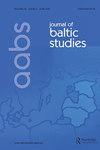“We” versus “others” in Estonian fiction: the question of national identity in the works of contemporary women writers
IF 0.5
4区 社会学
Q2 AREA STUDIES
引用次数: 0
Abstract
ABSTRACTThis article uses a postcolonial approach and the concept of Orientalization to uncover hierarchies in Estonian national identity construction. We examine the change in the articulation of the ‘other’ in the context of identity discourses of Estonians and Estonian Russian-speakers using literature by women authors in Estonia. We show how the interest of Estonian writers in the Russian community changed over time and then practically disappeared. We also demonstrate how, reflecting on their new post-imperial status, Estonian Russian-language literature eventually came to see Russians from Russia, rather than Estonians, as the key significant ‘other.’KEYWORDS: Estonianational identityRussian-speaking communitypostcolonial approachothernessOrientalizationliterature Disclosure statementNo potential conflict of interest was reported by the author(s).Notes1. The issue concerns predominantly Estonia and Latvia, where the Russian-speaking minorities make up about 25% of the overall population.Additional informationFundingThis work was supported by the Estonian Research Council, Grant No. PRG 1052.Notes on contributorsElena PavlovaElena Pavlova obtained her PhD degree from St. Petersburg State University in 2000 and MA in International Relations from the University Complutense, Madrid, Spain. Currently, she works as a Research Fellow at the Johan Skytte Institute of Political Science, University of Tartu, Estonia. Her research interests include theories of international relations, cultural studies, and postcolonial approach.Maili VilsonMaili Vilson is a PhD researcher at the Johan Skytte Institute of Political Studies of the University of Tartu, Estonia. Her dissertation project focuses on the Europeanization of national foreign policy of EU member states, based on the example of Estonia, Latvia, and Lithuania. She has served as an expert for several international think tanks, as well the Ministry of Foreign Affairs of Estonia. Her previous publications have focused on the Eastern Partnership and on the Europeanization of national foreign policy.爱沙尼亚小说中的“我们”与“他者”:当代女作家作品中的民族认同问题
摘要本文运用后殖民的研究方法和东方化的概念来揭示爱沙尼亚民族认同建构中的等级制度。我们研究的变化在“他者”的身份话语的背景下,爱沙尼亚和爱沙尼亚俄语使用者使用文学的女性作家在爱沙尼亚。我们将展示爱沙尼亚作家对俄罗斯社群的兴趣如何随著时间而改变,然后几乎消失。我们还展示了爱沙尼亚俄语文学如何反思他们新的后帝国地位,最终将来自俄罗斯的俄罗斯人,而不是爱沙尼亚人,视为关键的重要“他者”。关键词:爱沙尼亚民族认同、俄语社区、后殖民方法、东方化、文献披露声明作者未报告潜在的利益冲突。这个问题主要涉及爱沙尼亚和拉脱维亚,这两个国家讲俄语的少数民族约占总人口的25%。本研究由爱沙尼亚研究委员会资助,资助号:PRG 1052。2000年,叶莲娜·帕夫洛娃在圣彼得堡国立大学获得博士学位,在西班牙马德里康普顿斯大学获得国际关系硕士学位。目前,她在爱沙尼亚塔尔图大学约翰·斯基特政治学研究所担任研究员。她的研究兴趣包括国际关系理论、文化研究和后殖民方法。Maili Vilson是爱沙尼亚塔尔图大学约翰·斯凯特政治研究所的博士研究员。她的论文项目以爱沙尼亚、拉脱维亚和立陶宛为例,重点研究欧盟成员国国家外交政策的欧洲化。她曾担任几个国际智库以及爱沙尼亚外交部的专家。她以前的出版物集中于东方伙伴关系和国家外交政策的欧洲化。
本文章由计算机程序翻译,如有差异,请以英文原文为准。
求助全文
约1分钟内获得全文
求助全文
来源期刊

Journal of Baltic Studies
AREA STUDIES-
CiteScore
1.20
自引率
0.00%
发文量
52
期刊介绍:
The Journal of Baltic Studies, the official journal of the Association for the Advancement of Baltic Studies (AABS), is a peer-reviewed, multidisciplinary journal for the purpose of advancing the accumulation of knowledge about all aspects of the Baltic Sea region"s political, social, economic, and cultural life, past and present. Preference is given to original contributions that are of general scholarly interest. The Association for the Advancement of Baltic Studies is an international, educational, and scholarly non-profit organization. Established in 1968, the purpose of the Association is the promotion of research and education in Baltic Studies.
 求助内容:
求助内容: 应助结果提醒方式:
应助结果提醒方式:


